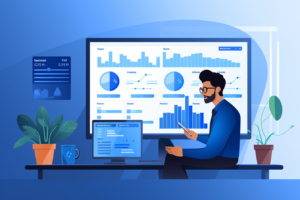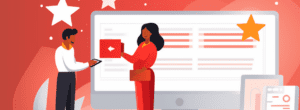Can AI make HR more 'human'?
- 6 Min Read
With the rise of artificial intelligence (AI) technology, HR departments now have the opportunity to revolutionize their practices, streamline operations, and enhance the overall employee experience. Contrary to popular belief, AI doesn’t replace the human touch in HR; instead, it augments HR professionals’ work, allowing them to focus on higher-value tasks such as talent development […]
- Author: HRD Connect
- Date published: Dec 20, 2023
- Categories

With the rise of artificial intelligence (AI) technology, HR departments now have the opportunity to revolutionize their practices, streamline operations, and enhance the overall employee experience.
Contrary to popular belief, AI doesn’t replace the human touch in HR; instead, it augments HR professionals’ work, allowing them to focus on higher-value tasks such as talent development and strategic planning.
Automating administrative tasks
One of the most significant benefits of AI in HR is its ability to automate time-consuming administrative tasks. While automation has been a part of HR for some time, AI takes it to a new level.
By leveraging AI technologies, HR professionals can offload low-value tasks, such as benefits management, answering employee queries, and processing leave forms. This automation not only saves time but also allows HR teams to shift their focus to more strategic initiatives.
With reduced administrative burdens, HR professionals can dedicate their efforts to activities that truly impact the organization, such as mentoring, feedback, and fostering strong workplace relationships.
According to a recent study by Harris Interactive and Eightfold.ai, organizations that adopt AI are 19% more effective in reducing the time spent on administrative tasks. By harnessing the power of AI, HR departments can free up valuable resources, enabling them to drive meaningful change and contribute to the overall success of the organization.
Transforming talent acquisition
Talent acquisition is a critical aspect of HR, and AI is revolutionizing the way organizations identify and attract top talent. Traditional candidate sourcing, screening, and interviewing processes can be time-consuming and resource-intensive.
However, AI-powered solutions can streamline these processes, significantly reducing the time and effort required.
AI can analyze hundreds of resumes in a fraction of the time it would take a human recruiter. By leveraging machine learning algorithms, AI can quickly identify the most qualified candidates by comparing their skills and experience with those of high-performing employees in similar roles.
Furthermore, AI-powered chatbots can engage with candidates, gather additional information, and provide real-time responses, expediting the recruitment process.
One of the most significant advantages of AI in talent acquisition is its ability to eliminate human bias. Unconscious biases often creep into the hiring process, hindering diversity and inclusion efforts. AI algorithms, on the other hand, rely on data-driven assessments, ensuring a fair and objective evaluation of candidates.
By leveraging AI in talent acquisition, organizations can build more diverse and inclusive workforces that drive innovation and success.
Streamlining employee onboarding
Employee onboarding sets the stage for a successful employment journey. When done right, it improves employee retention and engagement. AI technology can significantly enhance the onboarding process by providing new hires with personalized experiences tailored to their needs.
Through AI-powered systems, new employees can gain access to key contacts, training suggestions, and essential information about company policies and benefits. AI can guide them through the onboarding process, ensuring a seamless transition into their new roles.
Personalized onboarding experiences not only help employees acclimate to their new work environment but also demonstrate the organization’s commitment to their success and growth.
Enhancing employee training
AI’s impact on employee training is transformative. By integrating AI with learning management systems, HR professionals can deliver personalized training experiences that cater to individual needs and preferences. AI algorithms can identify skills gaps within the workforce and recommend training modules to bridge those gaps.
This data-driven approach allows HR teams to proactively address skill deficiencies and transform weaknesses into strengths.
Chatbots, powered by AI, can be integrated into training software, providing real-time support and guidance to learners. With 24/7 availability, chatbots can assist trainees, answer questions, and ensure efficient completion of training courses.
The combination of AI and training software empowers organizations to deliver effective, personalized training programs that drive employee development and improve overall performance.
Cognitive Decision-Making: Empowering Employees with AI Insights
AI technologies offer HR professionals the opportunity to empower employees with cognitive decision-making capabilities. By leveraging voice analysis and natural language processing, AI systems can assess an employee’s mood and provide recommendations, such as suggesting a break before a crucial meeting.
This technology assists employees in making informed decisions that positively impact their work experience.
Additionally, AI can optimize benefits management by providing employees with real-time information on vacation approvals. By analyzing data on previously approved vacation requests, AI systems can inform employees whether their desired time off is likely to be approved.
This empowers employees to make well-informed decisions about their time off while reducing the administrative burden on HR departments.
Increasing employee retention
Employee retention is a top priority for organizations, and AI can play a vital role in identifying and addressing factors that contribute to disengagement. By monitoring employees’ computer activities, AI systems can detect signs of disengagement or dissatisfaction. Any changes in behavior or communication patterns can trigger alerts to HR professionals, enabling them to intervene and address underlying issues promptly.
AI can also facilitate the development of programs that promote employee engagement and recognition. By analyzing employee data, AI systems can identify opportunities for recognition and rewards, fostering a positive work environment and increasing employee retention.
Challenges and considerations in AI adoption
While AI offers significant benefits to HR departments, there are challenges and considerations that organizations need to address. Reskilling employees is a critical aspect of AI adoption, as some roles may be impacted by automation. HR professionals must develop reskilling plans to equip employees with the necessary skills to thrive in the AI-driven workforce.
Ensuring employee privacy is another crucial consideration. HR departments must establish robust data management strategies that prioritize privacy and transparency. Employees should be informed about the data collected and how it is used in AI systems, fostering trust and compliance.
Bumpy rollouts and cybersecurity risks are additional challenges that organizations may face during AI adoption. It is essential to have flexible implementation strategies and collaborate closely with IT and security teams to mitigate potential risks.
The future of HR: Human-AI collaboration
The integration of AI into HR practices marks the beginning of a new era in human resource management. As AI technology continues to advance, HR professionals will play a critical role in leveraging its potential to drive organizational success. Human-AI collaboration will be crucial in shaping the future of HR, with AI serving as a valuable tool that enhances HR professionals’ capabilities and supports data-driven decision-making.
To unlock the full potential of AI in HR, organizations should invest in robust AI technologies and combine them with the expertise of HR professionals. By harnessing AI’s power, HR departments can redefine their practices, optimize employee experiences, and contribute to the overall success of their organizations.
In conclusion, AI has the potential to revolutionize HR by automating administrative tasks, streamlining talent acquisition and employee onboarding, enhancing employee training, empowering cognitive decision-making, and improving employee retention. While AI adoption presents challenges, organizations that embrace AI technologies and prioritize human-AI collaboration will be well-equipped to navigate the future of HR successfully.









